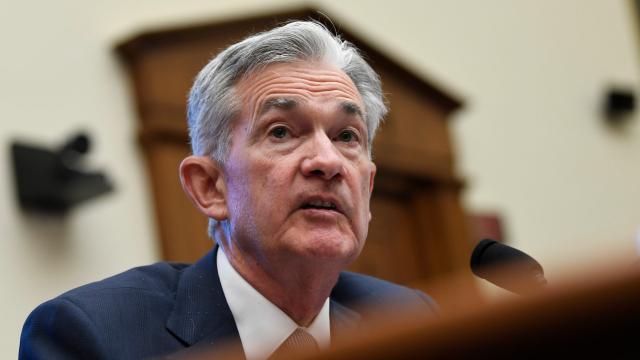Facebook’s already-troubled Libra cryptocurrency project, which has already run into significant opposition among the U.S. House Committee on Financial Services and the Senate Banking Committee, is running headlong into further resistance from regulators.
On Wednesday, Wired reported, Federal Reserve Chair Jerome Powell told the House committee that he has “many serious concerns” about Facebook’s pivot to finance in the arenas of privacy, money laundering, consumer protection, and the stability of the global financial structure.
He added that “The process of addressing these concerns should be a patient and careful one, not a sprint,” and that the Fed was working with other agencies and its foreign central banks to understand Libra’s possible impact.
According to Wired, Powell’s counterparts in other countries are raising similar concerns about the project, particularly because it would rely on a Switzerland-based association to manage the Libra platform and oversee its reserve fund, and thus “operate a global financial network outside of the usual framework of central banks like the Fed.” (Facebook is working with dozens of partner companies that would each be capped at one per cent voting power in the association, though it is by far the most prominent due to its plans to integrate Libra payments via wallet service named Calibra into its sprawling social network.)
Wired writes:
Powell’s concerns come on the heels of similar comments from top regulators in Europe and Asia. On Sunday, Benoît C”uré, an executive at the European Central Bank, described Libra as a “wake-up call” to regulators, saying it could not operate in a “void” outside the typical structure of central banks.
… Powell also confirmed that he had met with Facebook representatives in the months ahead of the Libra announcement, part of the tech company’s global tour of meetings with financial authorities. Apparently, many regulators left those meetings unsatisfied. Beyond the EU, regulators in the UK, Japan, and Singapore have called for greater scrutiny of Libra in recent weeks.
Earlier this week, Facebook said it has no plans to offer Calibra wallet services in India, where authorities banned banks from dealing with cryptocurrencies last year and reports have indicated a total ban may eventually be implemented.
Indian economic affairs secretary Subhash Garg told Bloomberg this week that the “Design of the Facebook currency has not been fully explained. But whatever it is, it would be a private cryptocurrency and that’s not something we have been comfortable with.”
Facebook has hundreds of millions of users in India, which World Bank data pegs as the world leader in remittances, which makes a failure to launch there a serious blow to its global financial ambitions.
Facebook does not operate in China, though Bloomberg recently reported that officials at the People’s Bank of China (PBC, the country’s central bank) raised concerns about Libra’s effects on lending, monetary policy, and “foreign exchange risks in economies with a volatile local currency, i.e. people switching from local currency to Libra en masse. According to the Bloomberg report, PBC deputy director of payments Mu Changchun also stated that Facebook has yet to explain how it will handle user privacy, money laundering, or terrorism concerns and stated the cryptocurrency must be regulated by monetary authorities.
Representative Maxine Waters, who has called for a moratorium on Libra’s development until concerns were addressed, also asked Powell whether Facebook could posture itself as a “too-big-to-fail” financial institution under the Dodd-Frank financial reform law at the hearing, Wired reported. Powell responded that has not been determined yet, though regulators are investigating the issue.
Facebook co-founder Chris Hughes, who has switched to becoming an outspoken critic of the company’s massive power, recently warned in a Financial Times op-ed that “The Libra Association’s goals specifically say that ability will encourage ‘decentralised forms of governance.’ In other words, Libra will disrupt and weaken nation states by enabling people to move out of unstable local currencies and into a currency denominated in dollars and euros and managed by corporations.”
Per CNBC, the growing pushback has resulted in growing industry scepticism that the Libra project will actually ever get off the ground by its planned launch date of the first half of 2020:
To successfully launch Libra and Calibra, Facebook will have to overcome numerous financial regulations regarding anti-money laundering, money transfer, securities and data privacy, said Charley Moore, the CEO of Rocket Lawyer, a San Francisco company that provides online legal services. Facebook will also have to navigate all of these regulations as they differ from region to region, Nayar said.
“In the U.S. alone, it can differ by city, by state and at the federal level,” he said. “Given the breadth of Facebook’s reach and the broad ambitions of the new Facebook coin, it’s hard to predict which area will be most challenging for them.”
“Many countries are legitimately freaked out about the ruthless amoral Facebook vampire squid having its tentacles jammed into their countries’ control of currency and banking systems,” early Facebook investor Matt Ocko told CNBC. “I hope to God that enlightened regulators kill this thing in its tracks.”
In response to a request for comment from Facebook, Wired wrote, the company directed them to a letter penned by Calibra chief David Marcus to sceptical senators, as well as said it agreed with Powell’s call for a “patient and careful” approach to launching the Libra project.
[Wired]
